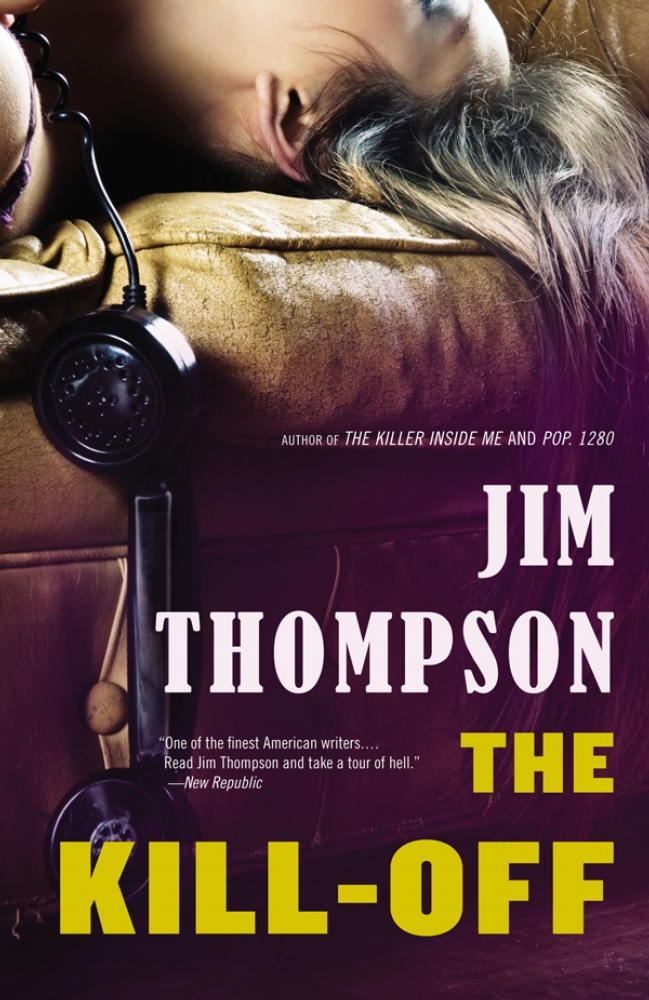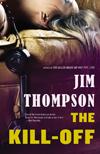The Kill-Off
Authors: Jim Thompson


The Kill-Off
Jim Thompson

Little, Brown and Company
New York Boston London
M
ostly, she was a woman who loved scandal—and lived by it.
Luane Devore made a specialty of being impetuous, bold, headstrong and—she thought—sultry.
Mostly, though…It was Sunday, only two days after the season had opened, when Luane Devore telephoned. As usual, she sounded a little hysterical. As usual, she was confronted with a dire emergency which only I could handle. Significantly, however—or at least I thought it significant—she did not calm down when I told her to go to hell, and to stop acting like a damned fool.
“Please, Kossy,” she burbled. “You must come! It’s vitally important, darling. I can’t talk about it over the telephone, but—”
“Why the hell can’t you?” I cut in. “You talk about everything and everyone else over the phone. Now, lay off, Luane. I’m a lawyer, not a baby-sitter. I’m here on a vacation, and I’m not going to spend all my time listening to you moan and whine about a lot of imaginary problems.”
She wept audibly. I felt a very small twinge of conscience. The Devore estate didn’t amount to anything any more. It had been years since I’d gotten a nickel out of her. So…well, you see what I mean. When people don’t have anything—when they can’t do anything for you—you kind of have to go a little easy on ’em.
“Now, take it easy, honey,” I said. “Be a big girl for Kossy. The world ain’t going to come to an end if I don’t dash up there right now. It ain’t going to kill you, is it?”
“Yes,” she said. “Yes, it is!” And then she hung up with a wild sob.
I hung up also. I came out of the bedroom, crossed the living room and returned to the kitchen. Rosa was at the stove, her back turned to me. She was talking, ostensibly mumbling to herself but actually addressing me. It is a habit of hers, one she has resorted to more and more frequently during the twenty-odd years of our marriage. I listened to the familiar words…
bum…loafer…time-waster…thinks-nothing-of-his-wife-but
…and for the first time in a long time I was affected by them. I began to get sore—angry and sad. And a little sick on the inside.
“So I’m sorry,” I said. “She’s a client. She’s in trouble. I’ve got no choice but to see her.”
“A client, he says,” Rosa said. “So, of course, everything else he must drop. She is his only client, is she not? His first case?”
“With a good lawyer,” I said, “it is always the first case. Don’t make such a production out of it, dammit. I’ll be back in a little while.”
“In a little while, he says,” Rosa said. “In a little while, he was going to help with the unpacking. He was going to help clean up the cottage, and take his wife bathing and—”
“I will,” I said. “Goddammit, you want me to put it in writing?”
“Listen to him,” she said. “Listen to the great attorney curse at his wife. See how he acts, the great attorney, when it is his wife he deals with.”
“Listen to yourself,” I said. “See how you act.”
She turned around unwillingly. I stood up and put on a performance, watching her face slowly turn red then white. I am pretty good at such mimicry. Painfully good, you might say. I have a talent for it; and when a man is only five feet tall, when he has had no formal law education—damned little formal education of any kind—he leaves no talent undeveloped.
“This is you,” I said. “Mrs. Abie. Why don’t you go on TV? Go into vaudeville? They love those characters.”
“N-now—” she smiled weakly. “I guess I’m not that bad, Mister Smarty.”
“Mister Smarty,” I said. “Now, there’s a good line. You just keep it up, keep building on that stuff, and we’ll be all fixed up. We’ll be getting a nice offer for our property.”
“Maybe,” she snapped, “we’d better not wait for an offer. If you’re ashamed of your own wife, if you’re so worried about what your friends may think of me—”
“What I’m ashamed of is someone that isn’t my wife. This character you’ve slipped into. Goddammit, you’re supposed to amount to something, and yet half the time you—”
I stopped myself short.
She said, “Listen to him, listen to the great attorney…” And then she caught herself.
We stood staring at each other. After a long moment, I started to break the silence; and the first word was a swear word and the second one was an ain’t. I broke off again. “Look at who’s talking,” I said. “Me, telling you how to behave!”
She laughed and put her arms around me, and I put mine around her. “But you’re right, darling,” she murmured. “I don’t know how I ever got into the habit of carrying on that way. You stop me if I do it any more.”
“And you stop me,” I said.
She warmed up the breakfast coffee, and we both had a cup. Chatting and smoking a cigarette while we drank it. Then, I got the car out of the garage, and headed up the beach road toward town.
Manduwoc is a seacoast town, a few hours train-ride from New York City. It is too far from the city for commuting; there are no local industries. According to the last census, the population was 1,280 and I doubt that it has increased since then.
It used to be quite a resort town, back before the war, but the number of summer visitors has declined steadily in recent years. The natives got a little too independent; they leaned a little too heavily on the gypping. So, what with so many places closer to the population centers, Manduwoc began to go downhill.
The largest hotel here has been boarded up for the past two summers. Some business establishments have closed down permanently; and at least a third of the beach cottages are never rented. There is still a considerable influx of vacationers, but nothing like there used to be. Practically the only people who come here now are those who own property here. People who, generally speaking, are out to save money rather than spend it.
The town proper sits a few hundred yards back from the ocean. Built around a courthouse square, it is adjoined, on the land side, by an area of summer estates, and, on the sea side, by the usual resort installations. These last include the aforementioned hotels and cottages, a couple of seafood restaurants, a boat-and-bait concession, a dance pavilion and so on.
Our cottage, which we own, is about three miles out. The others—the rent-cottages, I should say—are all close-in. I was approaching them, row upon row of identical clapboard structures, when a man stepped out onto the road and began to trudge toward the village. He was tall, stoop-shouldered, very thin. He had a mop of gray-black hair, and his angular, intelligent face was almost a dead white.
I pulled the car even with him and stopped. He went on walking, looking straight ahead. I called to him, “Rags! Rags McGuire!” And, finally, after another hail or two, he turned around.
He was frowning, in a kind of fiercely absent way. He came toward me slowly, his features twisted in that vacant scowl. And, then, suddenly, his face lit up with a smile of friendliness and recognition.
“Kossy! How are you, boy?” He climbed into the seat with me. “Where you been hiding yourself?”
I said that Rosa and I were just getting settled down; we’d be dropping by the pavilion as soon as we were finished. He beamed and slapped me on the back, and said that was the Kossy kid. And then he went completely silent. It wasn’t an awkward silence. Not seemingly, that is, on his part. But there was something about it, something about his smile—and his eyes—that made me more ill at ease than I have ever been in my life.
“I don’t suppose—” I hesitated. “I mean, is Janie with the band this summer?”
He didn’t say anything for several seconds. Then, he said no, she wasn’t with him. He had a new vocalist. Janie was staying in the city with the kids.
“I figure that gives her enough to do,” he added. “Just bringing the kids up right, y’know. After all, you take a couple of boys that age, and a woman don’t have time to—Yeah? You were saying, Kossy?”
“Nothing,” I said. “I mean—well, the boys are all right, then?”
“All right?” He looked bewildered for a moment. Then, he laughed amiably. “Oh, I guess you saw that little story in the papers, huh? Well, that wasn’t Janie. That wasn’t my family.”
“I see,” I said. “I’m certainly glad to hear it, Rags.”
“Ain’t it hell, though?” he said musingly. “A guy wants some publicity—he knocks himself out to get some—and he just can’t swing it. But let something phony come along, something that won’t do him no good, y’know, and he’ll make the papers every time.”
“Yeah,” I said. “That’s the way it seems to go, all right.”
“I thought about suing them,” he said. “But then I thought, what the hell? After all, it was a natural mistake. It was the same name—names—see? And Janie does have a rep for tipping the bottle.”
I was almost convinced. In fact, I’m not at all sure that I wasn’t. There were probably any number of small-time band leaders named McGuire. It would be easy to confuse one with another, particularly in a case where a story had to be written largely from newspaper files. And that had been the case in this instance. The two boys had died in the crash. Janie—if it
was
Janie—had lived, but she had been in a coma for days.
Rags had me drop him off in front of a bar. I drove on through town, wondering, worrying, then mentally shrugging. He wasn’t a close friend—not a friend at all, really. Just a guy I’d got to know during the summers I’d come here. I liked him, like I like a lot of people. But he wasn’t my business. Luane Devore was; and straightening her out would be headache enough for one day.
She lived in a two-story, brick box of a house on the land-side outskirts of Manduwoc. It sat a few hundred feet back from the road, at the apex of a wooded slope. The driveway curved up through an expanse of meticulously clipped, lushly green lawn; in the rear of the house, there was more lawn, stretching out fan-wise to the whitewashed gates and fences of the orchard, barnyard and pasture. I parked my car beneath the porte cochere and took a quick glance around the place.
A sleek Jersey grazed in the pasture. Several dozen Leghorns scratched and pecked industriously in the barnyard. A sow and half a dozen piglets wandered through the orchard, grunting and squealing contentedly as they gobbled the fallen fruit. Everything was as I remembered it from last season. Over all there was an air of peace and contentment, the evidence of loving care, of quiet pride in homely accomplishments.
You don’t find that much any more—that kind of pride, I mean. People who will give everything they have to a humble, run-of-the-mill job. All the office boys want to be company presidents. All the store clerks want to be department heads. All the waitresses and waiters want to be any damned thing but what they are. And they all let you know it—the whole lazy, shiftless, indifferent, insolent lot. They can’t do their own jobs well; rather, they won’t do them. But, by God, they’re going to have something better—the best! They’re going to have it or else, and meanwhile it’s a case of do as little as you can and grab as much as you can get.
So I stood there in the drive, looking around and feeling better the longer I looked. And, then, from an upstairs window, Luane Devore called down to me petulantly.
“Kossy?
Kossy!
What are you doing down there?”
“I’ll be right up,” I said. “Is the door unlocked?”
“Of course it’s unlocked! It’s always unlocked! You know that! How in the world could I—”
“Save it,” I said. “Keep your pants on. I’ll be right with you.”
I went in through the front door, crossed a foyer floor that was waxed and polished to a mirror-like finish. I started up the stairs. They were polished to the same gleaming perfection as the floors, and I slipped perilously once when I stepped off of the carpet runner. For perhaps the thousandth time, I wondered how Ralph Devore found the time to maintain the house and grounds as he did. For he did do it all, everything that was done here and a hundred other things besides. Luane hadn’t lifted a hand in years. It had been years since she had contributed a penny to maintaining the place.
There was a picture of them, Ralph and Luane, on the wall at the turn in the stairs. One of those enlarged, retouched photographs hung in an oval gilt frame. It had been taken twenty-two years before at the time of their marriage. In those days, Luane had resembled Theda Bara—if you remember your silent-motion-picture stars—and Ralph looked a lot like that Spanish lad, Ramon Navarro.
Ralph still looked pretty much as he had then, but Luane did not. She was sixty-two now. He was forty.
Her bedroom extended across the front of the house, facing the town. Through its huge picture window, she could see just about everything that went on in Manduwoc. And judging by the gossip I’d heard (and she’d started), she not only saw everything that happened but a hell of a lot that didn’t.
Her door was open. I went in and sat down, trying not to wrinkle my nose against that bedfast smell—the smell of stale sweat, stale food, rubbing alcohol, talcum and disinfectant. This was one room that Ralph could do nothing about. Luane hadn’t left it since God knows when, and it was so cluttered you could hardly turn around it.
There was a huge television set on one side of the room. On the other side was a massive radio, and next to it an elaborate hi-fi phonograph. They were operated from a remote control panel on a bedside table. Almost completely circling the bed were other tables and benches, loaded down variously with magazines, books, candy boxes, cigarettes, carafes, an electric toaster, coffee pot, chafing dish, and cartons and cans of food. Thus surrounded, with everything imaginable at her fingertips, Luane could make-do for herself during the long hours that Ralph was away. For that matter, she could have done so, anyhow. Because there was not a damned thing wrong with her. The local doctor said there wasn’t. So did a diagnostician I’d once brought down from the city. The local man “treated” her, since she insisted on it. But there was nothing at all wrong with her. Nothing but self-pity and selfishness, viciousness and fear: the urge to lash out at others from the sanctuary of the invalid’s bed.
I sat down near the window, and lighted a cigar. She sniffed distastefully, and I sniffed right back at her. “All right,” I said. “Let’s get it over with. What’s the matter now?”
